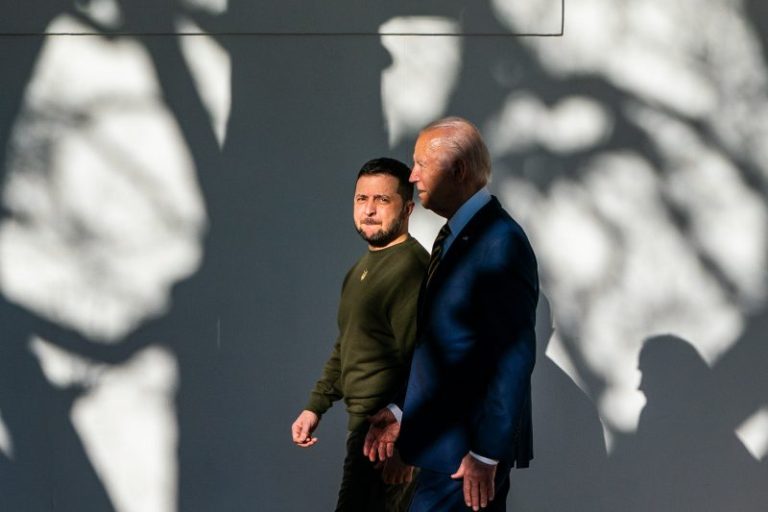The government of Ukraine has informed the White House that President Volodymyr Zelensky has decided to fire his top military commander, Gen. Valery Zaluzhny, in what would be the most consequential personnel shake-up of the war, said two people familiar with the discussion.
White House officials did not support or object to the high-stakes decision, but acknowledged it as the president’s sovereign choice, these people said, speaking on the condition of anonymity to discuss the sensitive conversation.
Zelensky has yet to issue a formal decree announcing the ouster of Zaluzhny, and it is uncertain when that might happen. The advance notice to Washington, which has not been previously reported, reflects the influential role of the United States as Ukraine’s most powerful military and political backer.
The early warning also provided the White House an opportunity to urge Zelensky to reconsider the pivotal decision — even though it decided against doing so.
The departure of Zaluzhny, one of the most popular figures in Ukrainian society, could affect troop morale and shake the confidence of Western donors as Ukraine’s military struggles to fend off advancing Russian forces. He and Zelensky have clashed over their divergent strategies for surmounting the battlefield setbacks as the war grinds into its third year.
But any move by the United States to challenge a decision by Zelensky, a popular figure in his own right, who has speculated privately that a new commander could rejuvenate Kyiv’s fortunes, could be seen as exercising undue influence.
“The perception of division at the top in Kyiv is not helpful for Ukraine, but the U.S. government should not get entangled in it,” said Steven Pifer, an Eastern Europe expert at Stanford University and a former U.S. ambassador to Ukraine.
“A president has the right to choose his cabinet as he sees fit. The decision should be squarely with Zelensky, as should the potential consequences,” added Alina Polyakova, president of the Center for European Policy Analysis.
Zelensky could choose to delay action on the decision indefinitely, but that appeared unlikely, said people familiar with his thinking.
Distrust between Zelensky and Zaluzhny has grown over the years, in part because the president has suspected Zaluzhny of harboring political ambitions but also because of disagreements about key military matters, including the general’s request to mobilize about 500,000 new soldiers.
In a tense Monday meeting, Zaluzhny argued that new recruits were needed to make gains on the battlefield in the face of Russia’s superior firepower and troop strength, said people familiar with the conversation. Ukraine also needed to prepare for personnel losses, which are expected to be comparable to last year’s, he said.
Zelensky pushed back on conscripting so many, in part because Ukraine lacks the money to pay them without significantly raising taxes for its citizens. Such aggressive conscription would also be politically unpopular.
“The president does not believe that this mass mobilization of men between the ages of 18 to 27 is desirable or warranted at this point,” said a person close to Zelensky.
During the meeting, Zelensky told Zaluzhny he was being dismissed, said a senior Ukrainian official.
On Monday, Zelensky’s spokesman, Serhiy Nykyforov, denied that the president had fired Zaluzhny, but he has not responded to requests for comment since then.
On Thursday, Zaluzhny published a column on CNN’s website in which he alleged that the Ukrainian government had failed to mobilize sufficient numbers of troops and called for an upgrade of the country’s high-tech warfare capabilities.
“We must acknowledge the significant advantage enjoyed by the enemy in mobilizing human resources and how that compares with the inability of state institutions in Ukraine to improve the manpower levels of our armed forces without the use of unpopular measures,” he wrote.
Finding a replacement for Zaluzhny is a significant challenge.
One potential candidate is Ukraine’s head of military intelligence, Lt. Gen. Kyrylo Budanov. The 38-year-old has a background in special forces, not as an army commander. His appointment would potentially signal a move toward asymmetric tactics — such as drone strikes deep into Russian territory — in a war whose front lines have been largely static in the last year.
But it is unclear if he wants the position, said a person familiar with the matter. “He loves his job and may want to keep just blowing stuff up in Russia,” said the person.
Another option is Oleksandr Syrsky, the current ground forces commander. The 58-year-old was credited with leading the defense of Kyiv in the first month of the war and then orchestrating a successful counteroffensive in the northeastern Kharkiv region in the fall of 2022.
But among rank-and-file soldiers, Syrsky is especially disliked, considered by many to be a Soviet-style commander who kept forces under fire too long in the eastern city of Bakhmut when Ukraine should have withdrawn.
“He’s a Gen. Patton-type character,” said the person close to Zelensky. “He doesn’t have a human resources gene in his body.”
Whoever replaces Zaluzhny, it may not end the public disputes between the general and the president, “and he will remain a popular figure in Ukraine,” said Angela Stent, a Russia expert and former U.S. intelligence official.
“It is unclear how it would affect Ukraine’s military performance,” she added. “That would depend on who succeeds him and how his successor is viewed by the rest of the military — and how effective his successor is on the battlefield.”
Isabelle Khurshudyan and David L. Stern in Kyiv contributed to this report.

